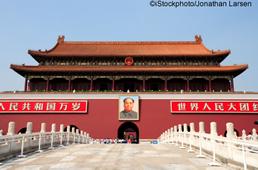
His reply: “Neither at the moment.” He then added that in 20 years’ time, the US will be dealing with a different set of leaders.
“The present leaders are part of the tail end of the Soviet-era. I mean, (President) Hu Jintao, (Premier) Wen Jiabao, their first foreign language is Russian. If you meet the young leaders at the level of city mayors, their first foreign language is English,” Singapore’s Minister Mentor said in a dialogue session.
“In 20 years, you are going to meet – assuming the structure remains more or less the same – president, premier, ministers of state, ministers, politburo members, who are completely at home, who will understand exactly what you say; will still negotiate with you in Chinese, but will sit down and have coffee with you or a meal with you and speak in fluent English.”
“They will probably have MBAs or PhDs from British or European or American universities and that will be a very different challenge.”
In the dialogue session, Lee also spoke about his role as Minister Mentor in the Singapore government and the importance of institutionalisation, in terms of building up institutions and developing institutionalised knowledge “that will improve successive generations who come along and stand on the shoulders of those who have been before them.”
“When my son (Lee Hsien Loong) became Prime Minister (in 2004), I had to either leave the cabinet, or he made quite sure that I am not deciding policy … In other words, I cannot give any direction to any ministry or to any minister. I can only mentor them.”
“They are just using me as a databank. I have got data stored from 50 years of political activity,” he added.
Lee, who was Singapore’s Prime Minister from 1959 until 1990, said one reason Singapore has done ‘reasonably well’ is “because we have no learning from scratch to be a minister or to be prime minister.”
His party, the People’s Action Party, has ruled Singapore for nearly fifty years. Lee's successor as prime minister was Goh Chok Tong, who had had a ‘good 20 years learning on the job’. His son, Lee Hsien Loong, now the country's prime minister, joined the government in 1984 and was deputy prime minister for 14 years. That ensured, as he put it, there was “no crashing of gears.”
“One of the problems of the revolving-door governments is, every few years you start the learning curve from zero. That’s the problem.”
Asked about moves by other territories, such as Abu Dhabi and Dubai, to emulate Singapore’s success, Lee said that, although Dubai is now an aviation hub, Singapore is “happy to welcome them.”
“The Iranians tell us they are putting a lot of business into Dubai and they have used it wisely and efficiently: hired world-class executives to run their airlines, to run their ports.”
“We do not compete,” Lee said, “we have a different algorithm. We cannot be like them because we have no oil money.”
“I think sustainability for us will be slightly easier because, as I said, institutionalisation is easier. We have got a homogenous core in every management that can self-renew. And we have got a lot of foreigners joining us, people from India, China, Hong Kong – but the spine is a Singapore spine.”
“So I think they have a different set of strengths. We have a different, completely different (set) – limited resources but more indigenous strength and we will have to see which model is more sustainable.”
-
View Comments
-
Leave a Comment




No comments yet.